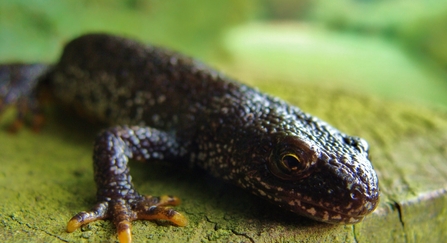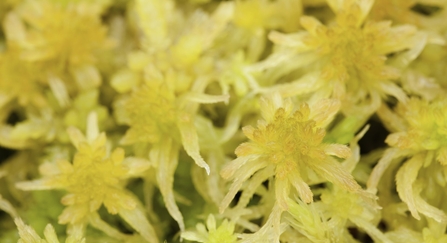The projects, taking place on and around Silfield Newt Reserve and East Winch Common, will help create, restore and connect places for Norfolk’s wildlife where the environment has been impacted by activities from previous road building.
Norfolk Wildlife Trust’s projects include investigating the potential of converting an existing pedestrian bridge over the A11 near Wymondham into a green bridge that links two County Wildlife Sites - Silfield Newt Reserve and The Lizard. A green bridge will reconnect two very important sites for wildlife will give small mammals, amphibians and reptiles the vital ability to move through our countryside, allowing them to thrive further afield.
The Wildlife Trust is also restoring and enhancing Silfield Newt Reserve, created as a new home for an important population of great crested newt displaced when the A11 was dualled. At NWT East Winch Common, Norfolk Wildlife Trust will be exploring how being close to the A47 might be affecting this Site of Special Scientific Interest and the wildlife that calls it home. By studying how water movement and pollution from vehicles might be affecting the site and its wild inhabitants, they will learn how to create a better place for wildlife. Initiatives such as restoring ponds and wet heath habitat will follow.
Wildlife species that will benefit from the planned works include great crested newts, dragonflies and plants including sphagnum mosses and insectivorous round-leaved sundew plants.

Great crested newt (credit: Kevin Caster)
Matt Jones, NWT Living Landscape Officer, says: "We welcome this new National Highways Partnership. We live in one of the most nature depleted countries in the world, and Norfolk’s wildlife is in trouble.
"There are some very special places for wildlife located alongside our major road network. We are looking forward to supporting an array of species through our work with National Highways, ranging from bats and small mammals to dragonflies and other invertebrates. The improvements will provide vital stepping stones in the landscape to enable wildlife to move between nearby areas of habitat."
Ash Murray, NWT's West Norfolk Reserves Manager, says: "This autumn, we will be restoring wet heath and ponds at East Winch Common to provide essential habitat for scarce plants such as round-leaved sundew, common dodder and compact bog moss."
Norfolk Wildlife Trust's projects are three of 26 projects which form the Network for Nature programme.
In England, the roadside estate is vast and yet is adjacent to some of our most precious habitats. When situated alongside linear infrastructure, such as motorways, habitats can create crucial corridors for pollinating insects, birds and small mammals, enabling wildlife to move through the wider landscape.

Sphagum moss (credit: Ross Hoddinott/2020VISION)
Nikki Robinson, Network for Nature Programme Manager for The Wildlife Trusts, says: "We’re very pleased that National Highways is committed to Network for Nature, with a strategic approach to restoring nature and joining up vital places for wildlife to help counter the damaging impacts of previous road building.
"Historic road building programmes have contributed to nature's decline, fragmenting wild spaces and causing environmental pollution, and this programme will help Wildlife Trusts throughout England carry out important nature conservation work, and contribute to a national Nature Recovery Network, connecting town and countryside, and joining up vital places for wildlife, and promoting landscape scale connectivity."
Stephen Elderkin, Environmental Sustainability Division lead for National Highways, says: "We're committed to significantly improving biodiversity near our road network, and the projects set out by The Wildlife Trusts will be a vital step in putting the strategic road network at the heart of nature’s recovery."
